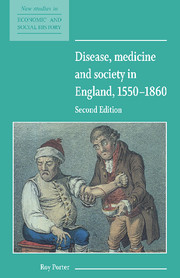Book contents
- Frontmatter
- Contents
- Introduction to the second edition
- Introduction
- 1 Disease, death and doctors in Tudor and Stuart England
- 2 The practice of medicine in early modern England
- 3 Experiences and actions: countering illness in the seventeenth and eighteenth centuries
- 4 Medicine in the market economy of the Georgian age
- 5 The medical profession and the state in the nineteenth century
- 6 The role of medicine: what did it achieve?
- Select bibliography
- Index
- New Studies in Economic and Social History
5 - The medical profession and the state in the nineteenth century
Published online by Cambridge University Press: 29 October 2009
- Frontmatter
- Contents
- Introduction to the second edition
- Introduction
- 1 Disease, death and doctors in Tudor and Stuart England
- 2 The practice of medicine in early modern England
- 3 Experiences and actions: countering illness in the seventeenth and eighteenth centuries
- 4 Medicine in the market economy of the Georgian age
- 5 The medical profession and the state in the nineteenth century
- 6 The role of medicine: what did it achieve?
- Select bibliography
- Index
- New Studies in Economic and Social History
Summary
In 1823 the surgeon and democrat Thomas Wakley founded a radical medical journal, the Lancet. Son of a Devonshire farmer, Wakley was an uncompromising, belligerent radical who fought in boxing booths in his youth, once walked from Devon to London, and adopted the style of a bruiser in his editorials, taking on the medical establishment. Indeed, early readers of the Lancet might be pardoned if they got the impression that English medicine was rotten to the core. Wakley shot deadly blasts at all the medical corporations, accusing them of neglecting their duties even as they abused their powers. London hospitals were nests of nepotism, one consequence of which was that the sick suffered neglect, mistreatment and hamfisted surgery. Privileged institutions purporting to protect the public in fact damaged its health. No wonder, argued the Lancet, people patronised the equally awful sharks and swindlers whose careers as quacks ought to have been terminated by decisive Collegiate action. In the midst of this ocean of corruption, only the honest surgeon-apothecary, that is, the emergent general practitioner, upheld the standards of true medicine; and for his pains, he could hardly make a decent living [98; 121].
We must take Wakley's whingeings with a pinch of salt. A man of passion and prejudice, he habitually dipped his pen in bile. The early nineteenth century did see dissatisfaction mounting, but that stemmed perhaps less from the feeling that the profession had reached rock bottom, than from a determination to secure better times ahead. Medicine began to grow militant.
Wakley certainly got one element of his diagnosis spot on, however.
- Type
- Chapter
- Information
- Disease, Medicine and Society in England, 1550–1860 , pp. 45 - 58Publisher: Cambridge University PressPrint publication year: 1995



